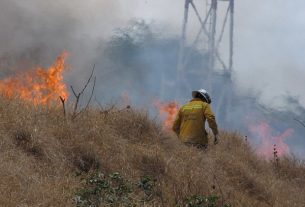A $1 billion appeal was launched by the UN on 16 February to assist 5.2 million people affected by the earthquake, including the 1.9 million people who were made homeless and who are now living in tents and temporary shelters.
Mr. Rodriguez gave UN News his impressions after visiting some of the most devastated communities.
“February 6, 2023, will be one of the few days of my career that I will never forget. On that day, twin earthquakes hit 11 provinces, nine hours apart. As of 27 February, the death toll in Türkiye was approximately 43,500, with more deaths in Syria. But, they are more than numbers. They were mothers, fathers, daughters and sons.
On February 11, five days after the disaster when I first visited the areas together with UN relief chief Martin Griffiths, what we saw was devastating. What were once homes, a sanctuary for families, which were filled with memories, were in ruins.
Alvaro Rodriguez, UN Resident and Humanitarian Coordinator for Türkiye (left) is briefed by a staff member of Doctors Worldwide Türkiye (Yeryüzü Doktorları) at a camp in Kahramanmaraş for people displaced by the earthquake
Anger, frustration, sadness
No words are enough to explain the level of suffering of the people. When we went there, we saw fathers and mothers, sons and daughters in great sadness and pain. They were watching the search and rescue teams and trying to look for their loved ones. By the fifth day, it was very unlikely that anyone was alive. There was anger, there was frustration, people were very sad.
On February 23, I went back to the areas affected by the twin earthquakes and met with authorities and first responders at the tent city established in Onikişubat Stadium in Kahramanmaraş, where 5,000 people have been taking refuge. I visited the tents of Doctors Worldwide Türkiye (Yeryüzü Doktorları) which provides medical services at the tent city.
As we visited Türkoğlu, just outside of Kahramanmaraş, so many of the conflicting emotions for dealing with a disaster like this one came to mind when I saw children playing. It was as if there was no loss of life. Just a few miles away, you literally have thousands of people who died in the space of nine hours.
We were also fortunate enough to visit an emergency medical team, provided by the British Government. They are doing a tremendous service. I asked myself, what happens in the rest of the 11 provinces where the disaster devastated communities there?
The Turkish nation, the Turkish people and the Turkish State, together with international organizations, have been providing all necessary interventions and support since day one. We, as the UN, were also there on the ground from day one. We also lost five members of our UN family in Türkiye in this terrible disaster.
Flash Appeal
The UN has launched a $1 billion humanitarian appeal, which covers a three-month-period, for 5.2 million victims of the earthquakes.
The resources will allow aid organizations to swiftly ramp up their operations to support Government-led response efforts in areas including food security, protection, education, water and shelter.
In line with the Flash Appeal, UN disaster assessment teams remain active in southeastern Türkiye to support the coordination of urban search-and-rescue operations and assist in the needs assessments. A liaison team in the capital, Ankara, is also working with Turkish authorities, who are leading the response.

Malatya, Türkiye was one of the towns affected by the earthquake
But, as of February 24, only seven per cent of the $1 billion flash appeal was funded.
Türkiye is also home to the largest number of refugees in the world and has shown enormous generosity to its Syrian neighbors for years. Now is the time for the world to support the people of Türkiye – just as they have stood in solidarity with others seeking assistance.
We need the international community to act now to provide the lifesaving funds.”
- The UN Resident Coordinator, sometimes called the RC, is the highest-ranking representative of the UN development system at the country level.
- In this occasional series, UN News is inviting RCs to blog on issues important to the United Nations and the country where they serve.
- Learn more about the work of the UN in Türkiye.



